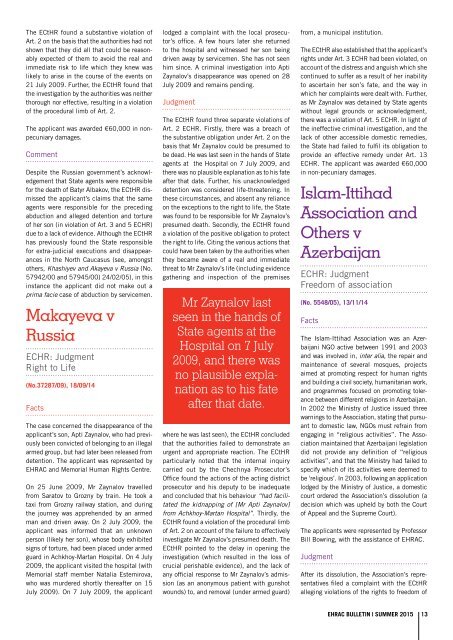EHRAC-Summer-Bulletin-2015-WEB
EHRAC-Summer-Bulletin-2015-WEB
EHRAC-Summer-Bulletin-2015-WEB
Create successful ePaper yourself
Turn your PDF publications into a flip-book with our unique Google optimized e-Paper software.
The ECtHR found a substantive violation ofArt. 2 on the basis that the authorities had notshown that they did all that could be reasonablyexpected of them to avoid the real andimmediate risk to life which they knew waslikely to arise in the course of the events on21 July 2009. Further, the ECtHR found thatthe investigation by the authorities was neitherthorough nor effective, resulting in a violationof the procedural limb of Art. 2.The applicant was awarded €60,000 in nonpecuniarydamages.CommentDespite the Russian government’s acknowledgementthat State agents were responsiblefor the death of Batyr Albakov, the ECtHR dismissedthe applicant’s claims that the sameagents were responsible for the precedingabduction and alleged detention and tortureof her son (in violation of Art. 3 and 5 ECHR)due to a lack of evidence. Although the ECtHRhas previously found the State responsiblefor extra-judicial executions and disappearancesin the North Caucasus (see, amongstothers, Khashiyev and Akayeva v Russia (No.57942/00 and 57945/00) 24/02/05), in thisinstance the applicant did not make out aprima facie case of abduction by servicemen.Makayeva vRussiaECHR: JudgmentRight to Life(No.37287/09), 18/09/14FactsThe case concerned the disappearance of theapplicant’s son, Apti Zaynalov, who had previouslybeen convicted of belonging to an illegalarmed group, but had later been released fromdetention. The applicant was represented by<strong>EHRAC</strong> and Memorial Human Rights Centre.On 25 June 2009, Mr Zaynalov travelledfrom Saratov to Grozny by train. He took ataxi from Grozny railway station, and duringthe journey was apprehended by an armedman and driven away. On 2 July 2009, theapplicant was informed that an unknownperson (likely her son), whose body exhibitedsigns of torture, had been placed under armedguard in Achkhoy-Martan Hospital. On 4 July2009, the applicant visited the hospital (withMemorial staff member Natalia Estemirova,who was murdered shortly thereafter on 15July 2009). On 7 July 2009, the applicantlodged a complaint with the local prosecutor’soffice. A few hours later she returnedto the hospital and witnessed her son beingdriven away by servicemen. She has not seenhim since. A criminal investigation into AptiZaynalov’s disappearance was opened on 28July 2009 and remains pending.JudgmentThe ECtHR found three separate violations ofArt. 2 ECHR. Firstly, there was a breach ofthe substantive obligation under Art. 2 on thebasis that Mr Zaynalov could be presumed tobe dead. He was last seen in the hands of Stateagents at the Hospital on 7 July 2009, andthere was no plausible explanation as to his fateafter that date. Further, his unacknowledgeddetention was considered life-threatening. Inthese circumstances, and absent any relianceon the exceptions to the right to life, the Statewas found to be responsible for Mr Zaynalov’spresumed death. Secondly, the ECtHR founda violation of the positive obligation to protectthe right to life. Citing the various actions thatcould have been taken by the authorities whenthey became aware of a real and immediatethreat to Mr Zaynalov’s life (including evidencegathering and inspection of the premisesMr Zaynalov lastseen in the hands ofState agents at theHospital on 7 July2009, and there wasno plausible explanationas to his fateafter that date.where he was last seen), the ECtHR concludedthat the authorities failed to demonstrate anurgent and appropriate reaction. The ECtHRparticularly noted that the internal inquirycarried out by the Chechnya Prosecutor’sOffice found the actions of the acting districtprosecutor and his deputy to be inadequateand concluded that his behaviour “had facilitatedthe kidnapping of [Mr Apti Zaynalov]from Achkhoy-Martan Hospital”. Thirdly, theECtHR found a violation of the procedural limbof Art. 2 on account of the failure to effectivelyinvestigate Mr Zaynalov’s presumed death. TheECtHR pointed to the delay in opening theinvestigation (which resulted in the loss ofcrucial perishable evidence), and the lack ofany official response to Mr Zaynalov’s admission(as an anonymous patient with gunshotwounds) to, and removal (under armed guard)from, a municipal institution.The ECtHR also established that the applicant’srights under Art. 3 ECHR had been violated, onaccount of the distress and anguish which shecontinued to suffer as a result of her inabilityto ascertain her son’s fate, and the way inwhich her complaints were dealt with. Further,as Mr Zaynalov was detained by State agentswithout legal grounds or acknowledgment,there was a violation of Art. 5 ECHR. In light ofthe ineffective criminal investigation, and thelack of other accessible domestic remedies,the State had failed to fulfil its obligation toprovide an effective remedy under Art. 13ECHR. The applicant was awarded €60,000in non-pecuniary damages.Islam-IttihadAssociation andOthers vAzerbaijanECHR: JudgmentFreedom of association(No. 5548/05), 13/11/14FactsThe Islam-Ittihad Association was an AzerbaijaniNGO active between 1991 and 2003and was involved in, inter alia, the repair andmaintenance of several mosques, projectsaimed at promoting respect for human rightsand building a civil society, humanitarian work,and programmes focused on promoting tolerancebetween different religions in Azerbaijan.In 2002 the Ministry of Justice issued threewarnings to the Association, stating that pursuantto domestic law, NGOs must refrain fromengaging in “religious activities”. The Associationmaintained that Azerbaijani legislationdid not provide any definition of “religiousactivities”, and that the Ministry had failed tospecify which of its activities were deemed tobe ‘religious’. In 2003, following an applicationlodged by the Ministry of Justice, a domesticcourt ordered the Association’s dissolution (adecision which was upheld by both the Courtof Appeal and the Supreme Court).The applicants were represented by ProfessorBill Bowring, with the assistance of <strong>EHRAC</strong>.JudgmentAfter its dissolution, the Association’s representativesfiled a complaint with the ECtHRalleging violations of the rights to freedom of<strong>EHRAC</strong> BULLETIN | SUMMER <strong>2015</strong>13


